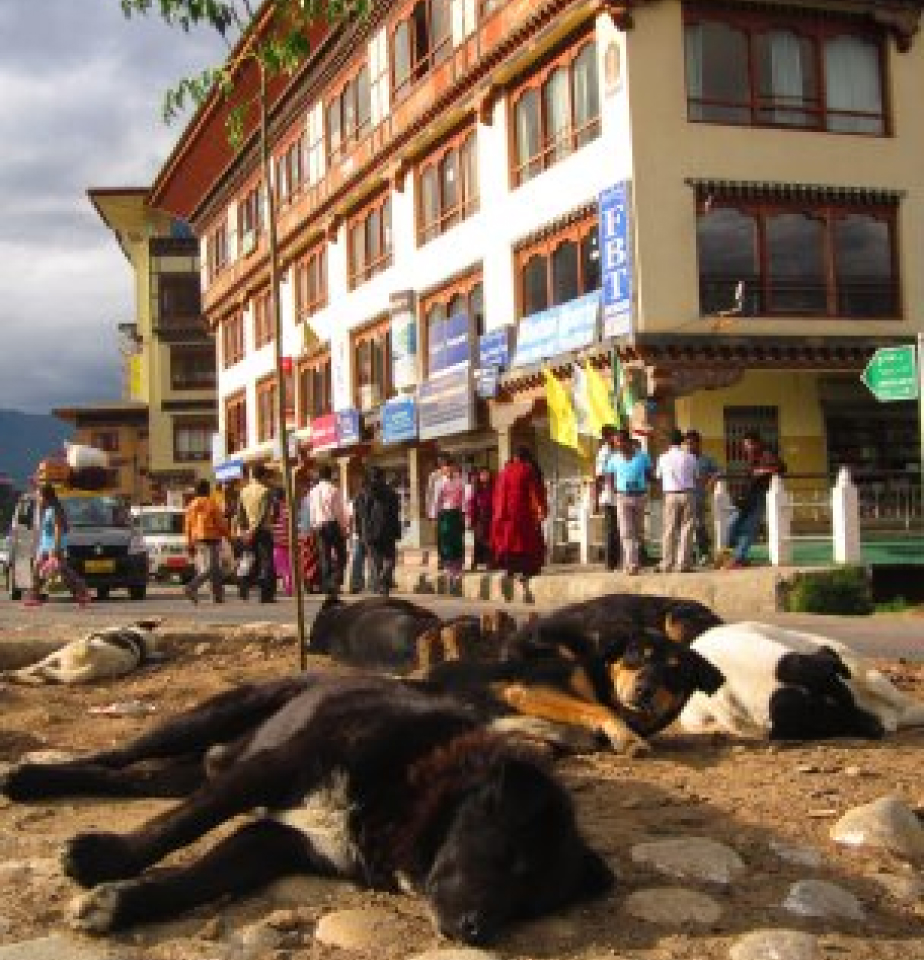
Bhutan, a small Buddhist Kingdom nestled in the Himalayas, is perhaps best known for pioneering the concept of Gross National Happiness. It also promotes happy coexistence of humans and animals and has a reputation for being home to a large population of free dogs.
While dogs traditionally played an important role in Bhutanese life, helping yak herders protect their cattle and guarding farmers from wild animals, increasing urbanization has forced these canines to adapt to a new way of life. The stray dog and cat populations have grown as the country has become more developed and urbanised, facilitated by peoples’ compassion and the sharing of food with free dogs.
With urbanisation, values are changing and stray animals are increasing seen as a ‘problem’. At the same time vehicle accidents with animals have increased, especially harming dogs, cattle, horses and mules. Further, human-wildlife conflict is increasing leading to captured and injured wildlife needing care and rehabilitation.
Due to Bhutan’s mountainous inaccessible terrain there is also still a challenge in outreach of veterinary services and animal welfare programmes in rural areas.



BARC began as the personal initiative of Marianne Guillet, a French architect and geographer turned veterinarian and Hendrik Visser, a Dutch civil engineer and sociologist.
Arriving in the small Bhutanese village of Zhemgang in June 1997, Marianne and Hendrik were struck by the suffering of sick, injured, or starving dogs. Over the next three years, they began feeding and treating the dogs in Zhemgang , bringing them into their home for long-term care when necessary. People began to bring in wounded stray animals or sick pets for treatment, from dogs that had been found crippled by the side of the road to pet cats afflicted with skin disease.
Each animal was treated, vaccinated, dewormed, and sterilised. Those that could not be returned to their original environment (e.g. if a caring family or regular food supply was not available) would be put up for adoption. Some patients, debilitated by handicaps or chronic diseases, became permanent house guests.
As more rescued animals were brought in, Marianne and Hendrik’s home gradually transformed into a hospital. Between 1997 and 1999, with the help of veterinary services in Thimphu, over a thousand sick and injured dogs in Zhemgang were nursed back to health, sterilised, and vaccinated. In November 1997 a baby macaque named Pilou was rescued from a vegetable market in Thimphu, and a second one was brought in by a Bhutanese forestry worker who found it chained to a pole in the south of Bhutan


By then, what began as a personal initiative had evolved into a community-driven campaign to improve the lives of mankind’s fellow sentient beings in Bhutan. Friends and fellow animal lovers felt that an organized effort was needed to improve the outreach and effectiveness of the campaign and increase the sustainability of ongoing rescue and care work. In June 2013, together with friends and supporters, the Bhutan Animal Rescue and Care (BARC) was established and registered as a Civil Society Organization in Bhutan.
While currently much of BARC’s work is still done and financed by Marianne and Hendrik, we hope that in future BARC will be fully sustained by the compassion of both the people of Bhutan and fellow animal lovers around the world.